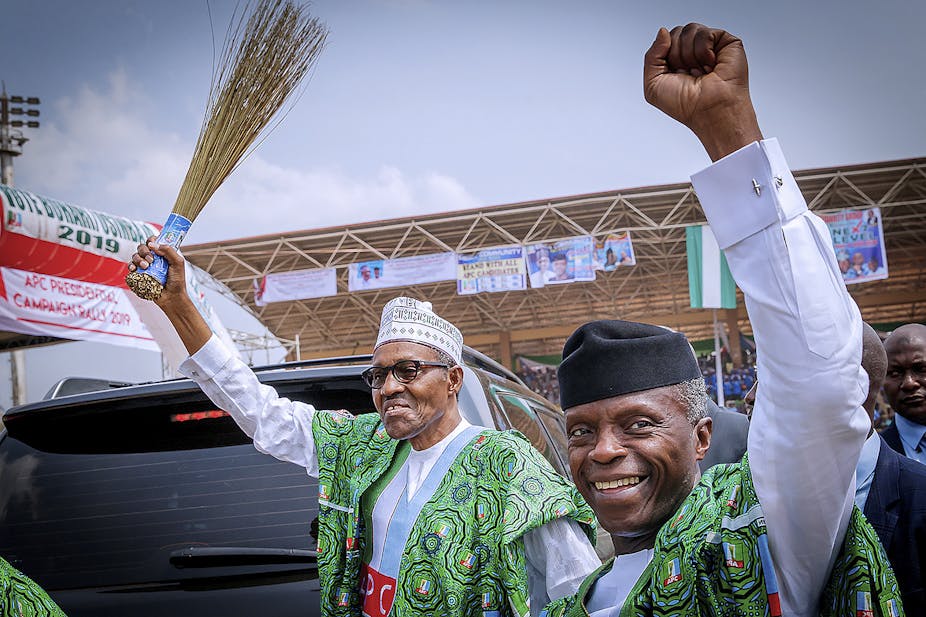A close race was predicted between Muhammadu Buhari and his main rival Atiku Abubakar. In the end the incumbent won the Nigerian presidential election with almost four million votes.
After the results were declared, Atiku cried foul, pointing out numerous flaws and manipulations of the electoral process. He also threatened legal action although it remains to be seen if the Peoples Democratic Party candidate will file suit within 21 days of the vote as required.
Meanwhile, international leaders have already congratulated Buhari and his All Progressives’ Congress. This is to be expected. External actors have often tended to prefer stability over denunciation when it comes to incredulous election results.
Hence this still begs the question: did Buhari actually win? Several problems marked the electoral process itself. But, in my view, while the election results were prone to manipulation, the result indicates that Buhari’s party did in fact win.
The question is: how did he do it given his poor track record in his first term? Several factors stand out from the election results: Buhari’s continued popularity in the north, combined with voter apathy in the south. And the fact that Atiku was an uninspiring contestant.
Buhari’s failures
Buhari came to power in 2015 after defeating incumbent president Goodluck Jonathan with around 2.5 million votes. His victory at the time can be attributed to his tough stance on corruption, his poverty alleviation promises, and the Jonathan administration’s failure to curb the Boko Haram crisis.
In addition, Jonathan’s decision to run again as a Southern candidate had caused rifts in the Peoples Democratic Party with many, especially northern, political stalwarts defecting to the All Progressives’ Congress during his presidency. Buhari’s candidacy had already been strengthened by his coalition with the south-western Action Congress of Nigeria.
Buhari’s first term in office can be rated rather poorly.
His administration was struck with the double whammy of a severe recession and a drop in revenues from oil due to falling oil prices. The government’s responses were slow and mostly inadequate. This was partly due to Buhari’s long absence from home undergoing treatment for an undisclosed illness.
The Buhari government also didn’t perform very well on the security. While the Boko Haram crisis was pushed back during his first year in office, it resurfaced as the group split into several deadly factions. Farmer-herder conflict in the Middle Belt has also spun out of control. And the roots of new violent crises may have been laid with the brutal repression of the Indigenous Peoples of Biafra movement as well as the arrest of Muslim clerk El-Zakzaky and violence against his followers.
Finally, while Buhari has indeed taken actions against corruption, the battle against graft has often appeared to be a battle against political enemies. And little has been achieved at the policy level due to severe legislative-executive gridlock during his first term.
So why the win?
In the end the electoral map of 2019 closely resembles that of 2015 with most northern and south-western states going to the All Progressives’ Congress. In Lagos, the All Progressives’ Congress won a slight majority in the face of economic decline, but campaigned primarily to get voters to go to the polls. This only partly succeeded.
In the north, the All Progressives’ Congress’s vote share generally dropped on a state-by-state level, but turnout was high enough vis-à-vis the south to win the elections overall.
The Peoples Democratic Party did not substantially increase its leverage in the Middle Belt states, which are most affected by the herdsmen-farmer conflict. Particularly noteworthy is Atiku’s poor performance in the North in general. His home state of Adamawa was only won with a slim majority.
Buhari’s continued popularity in the North can partly be explained by the fact that the region is more insulated from international market dynamics. This means that the effects of the recession were less severe. While poverty remains more entrenched in the region, this was to some extent alleviated by the government’s subsidy programmes. These also extended patronage to localities which had before largely been excluded from such networks.
Besides this, and from a more emotional perspective, many of Buhari’s supporters still continue to view him as their political messiah.
Atiku had his weaknesses
After its loss to the All Progressives’ Congress in 2015, the Peoples Democratic Party itself remained for a long time mired in internal conflict. In the middle of a leadership crisis, the party lost political elites and followers, also due to the sudden cut-off from patronage resources.
The party came together again near the end of 2017, but had to rebuild its grassroots structures in many areas. This could have led to the lack of mobilisation in the south. While the All Progressives’ Congress lost important political figures, the party also convinced some powerful Peoples Democratic Party politicians in the South to defect in the run-up to the elections.
Another factor was that, while rotational politics necessitated a northern candidate, Atiku’s candidacy may not have resonated particularly strongly in the south.
Besides his regional origin, Atiku as a candidate also had his weaknesses, including a credibility problem due to the riches he collected during his time in office as vice-president and his old age. For many voters in both the north and the south, Atiku represented a return to the past rather than a break from traditional Nigerian politics.
Buhari’s first term record has little to show for it, but it is in the end still possible that he did win the elections, simply because the Peoples Democratic Party could not provide any viable alternative.

